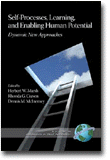
Self-Processes, Learning and Enabling Human Potential
Dynamic New Approaches
Edited by:
Herbert Marsh, University of Western Sydney
Rhonda G. Craven, University of Western Sydney
Dennis M. McInerney, The Education University of Hong Kong
A volume in the series: International Advances in Self Research. Editor(s): Herbert Marsh, Australian Catholic University. Rhonda G. Craven, Australian Catholic University. Dennis M. McInerney, The Education University of Hong Kong. Frédéric Guay, Université Laval Québec. Theresa Dicke, Australian Catholic University.
Published 2008
This volume deals with a wealth of issues related to self, from the overarching theoretical perspective of Bandura and his careful and thorough analysis of the agentic self, highlighting the complexities of our multiple selves acting in an integrated, holistic, and dynamic fashion, to the engaging and novel treatment of self concept as a rope by John Hattie. From many of the chapters we see the utility value of the social cognitive theory and self-determination theory frameworks for interpreting self-processes and how these processes might drive engagement in learning. In particular we see how autonomy support, self-regulation, self-efficacy, and self-regulation are part and parcel of self-processes intimately involved as individuals work out their futures and possible selves. Entwined with these processes are the development of identity, resilience, and a sense of well-being. The BFLPE and bullying chapters provide two examples of self-processes in operation in the school context.
What can we take from this? Self-processes are complex, differentiated,and yet coordinated. By focusing on the agentic self we consider the whole person-picture as a rich, integrated, and dynamic tapestry and by focusing on differentiated self elements such as self-regulation, self-determination, self-concept, and self-efficacy, we are able to examine, in more detail, some of the individual threads of the tapestry and the roles they play in the integrated self. Overall, we learn that self-processes are dynamic and are fundamental to enabling human potential.
CONTENTS
About the Monograph Series. PART I: Overview. Self-Processes, Learning, and Enabling Human Potential, Dennis M. McInerney, Herbert W. Marsh, and Rhonda Craven. PART II: Dynamic Views of the Self. Toward an Agentic Theory of the Self, Albert Bandura. Processes of Integrating, Developing, and Processing Self Information, John Hattie. Self-Concept is as Multidisciplinary as it is Multidimensional: A Review of Theory, Measurement,and Practice in Self-Concept Research, Herb W. Marsh and Alison J. O’Mara. PART III: Self-Determination, Self Regulation and Self Efficacy. Day-to-Day Variation in Competence Beliefs: How Autonomy Support Predicts Young Adolescents’ Felt Competence, Yi-Miau Tsai, Mareike Kunter, Oliver Lüdtke, and Ulrich Trautwein. Meet the Parents: Mothers’ and Fathers’ Contextual and Psychological Resources Associated to Adolescents’ Perceptions of Parental Autonomy Support, Frédéric Guay and Julien Chanal. In Search of Self-Regulated Learning: A Personal Quest, Barry J. Zimmerman. Evaluating Competence and Maintaining Self-Worth between Early and Middle Childhood: Blissful Ignorance or the Construction of Knowledge and Strategies in Context? Ruth Butler. Teacher Self-Efficacy: Conceptual Analysis and Relations with Teacher Burnout and Perceived School Context, Einar M. Skaalvik and Sidsel Skaalvik. PART IV: Identity Processes, Possible Selves, Well-Being, and the Resilient Self. Egosystem and Ecosystem Goals and Adjustment to College, Jennifer Crocker, Juliana G. Breines, Amy Canevello, Mary Y. Liu, and Yu Niiya. Possible Selves: Identity-Based Motivationand School Success, Daphna Oyserman. The Resilient Self: Lessons Educators Can Take Away from Risk and Resilience
Research, Bridget V. Ammon and Martin L. Maehr. Self and Socialization: How Do Young People Navigate Through Adolescence? Jari-Erik Nurmi. PART V: Applied Educational Research. Class-Average Achievement, Marks, and Academic Self-Concept in German Elementary Schools, Olaf Köller, Horst Zeinz, and Ulrich Trautwein. East Meets West: An Examination of the Big-Fish-Little-Pond Effect in Western and Non-Western Countries, Marjorie Seaton, Rhonda G. Craven, and Herbert W. Marsh. The Beyond Bullying Secondary Program: An Innovative Program Empowering Teachers to Counteract Bullying in Schools, Roberto H. Parada, Rhonda G. Craven, and Herbert W. Marsh. Contributors.
REVIEWS
"...a rich array of knowledge on the critical and essential underlying processes that support the development and realization of the possible self. This material will be invaluable to both scholars and practitioners who are engaged in teaching, counseling and supporting the development of human potential." Sharon Harsh in Education Review
-
Paperback978-1-59311-903-4
Web price: $62.04 (Reg. 72.99)
-
Hardcover978-1-59311-904-1
Web price: $89.24 (Reg. 104.99)
- eBook9781607526186

-
 International Advances in Self Research - volume 1
International Advances in Self Research - volume 1
-
 New Frontiers for Self Research
New Frontiers for Self Research
-
 SELF - A Multidisciplinary Concept
SELF - A Multidisciplinary Concept
-
 SELF - Driving Positive Psychology and Wellbeing
SELF - Driving Positive Psychology and Wellbeing
-
 Self-Concept, Motivation and Identity
Underpinning Success with Research and Practice
Self-Concept, Motivation and Identity
Underpinning Success with Research and Practice
-
 The Handbook for Aspiring Higher Education Leaders
The Handbook for Aspiring Higher Education Leaders
-
 Theory Driving Research:
New Wave Perspectives On Self-Processes And Human Development
Theory Driving Research:
New Wave Perspectives On Self-Processes And Human Development

